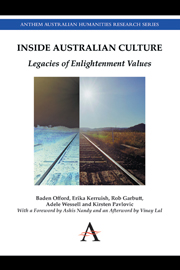Book contents
- Frontmatter
- Contents
- Foreword. Is Australia a Victim of the Ethical Limits of the Enlightenment? A Modest Foreword for an Immodest Venture
- Preface and Acknowledgements
- Chapter One Introduction
- Part One Getting Inside Australian Public Culture
- Part Two Three Moments of the Enlightenment
- Part Three Working with the Necessary Other
- Afterword. The Emptiness Within and Without: Enlightenment Australia and Its Demons
- Notes
- Index
Foreword. Is Australia a Victim of the Ethical Limits of the Enlightenment? A Modest Foreword for an Immodest Venture
Published online by Cambridge University Press: 05 October 2014
- Frontmatter
- Contents
- Foreword. Is Australia a Victim of the Ethical Limits of the Enlightenment? A Modest Foreword for an Immodest Venture
- Preface and Acknowledgements
- Chapter One Introduction
- Part One Getting Inside Australian Public Culture
- Part Two Three Moments of the Enlightenment
- Part Three Working with the Necessary Other
- Afterword. The Emptiness Within and Without: Enlightenment Australia and Its Demons
- Notes
- Index
Summary
For more than two hundred years, the Enlightenment vision and the values it sanctions have provided the standard by which all cultures have been judged in the civilised world. It has shaped virtually every new imagination of a desirable society and every radical intervention in societies and states, even when – during this same period – Enlightenment values have also often been used to justify some of the major projects of Satanism in our times.
Everyone has the right to one's own clichés, as C. P. Snow used to say, so I reaffirm my belief that human beings, given enough time, opportunity and a culture of impunity, can turn any theory of salvation – secular or nonsecular – into its opposite. For instance, not only did the participants in the Atlantic slave trade find support in the idea of infrahuman Africans being brought into civilisation, but some who penned the world's first democratic constitution did not find it abnormal that they themselves had large, private retinues of slaves. Nor did the colonial powers in Asia and Africa hesitate to borrow from newly fashionable theories of evolution to justify their colonial conquests and to look at the colonised as newfound apprentices who would, in the long run, ‘Europeanise’ the globe. I, for one, find it impossible to trace the ethical, intellectual and political trajectory of the nineteenth century and the first half of the twentieth century without referring to the Enlightenment and the age of reason.
- Type
- Chapter
- Information
- Inside Australian CultureLegacies of Enlightenment Values, pp. vii - xiiPublisher: Anthem PressPrint publication year: 2014



